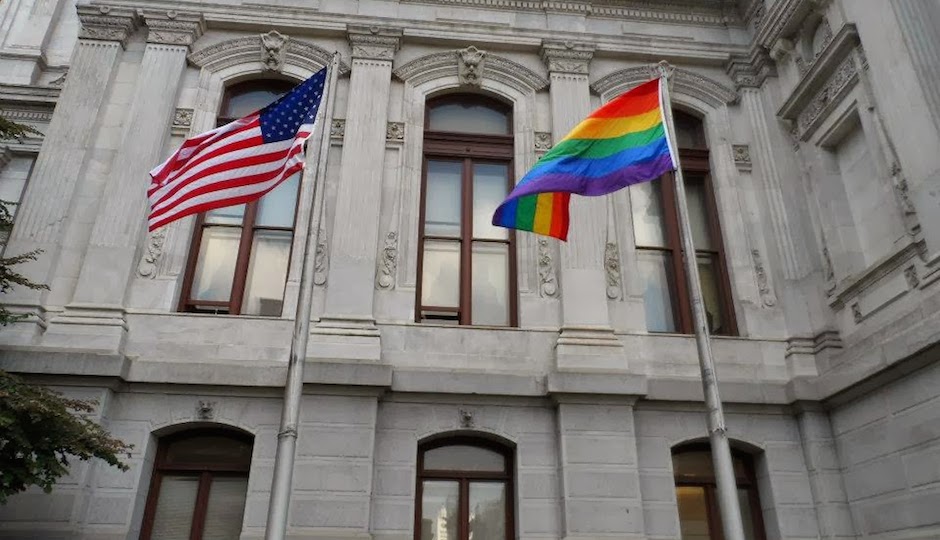OPINION: Mayor’s Office of LGBT Affairs Should Seriously Address the Gayborhood’s Racial Insensitivity

Photo courtesy of Philly Bricks.
A little more than a year ago I first shared publicly my experience of dealing with racial insensitivity in the Gayborhood. After that, I took the conversation national, telling the rest of the world that diversity issues do exist within our LGBTQ scene and that it’s time to address it. I soon realized that I wasn’t alone — other prominent members of the community also had notable thoughts on the issue.
At one point, things looked promising. There was a town hall last fall — spearheaded by Philly Black Pride after a summer of heated discussions and a petition I started calling for the Gayborhood to diversify — that included members and leaders of the community sharing their own uncomfortable experiences at Gayborhood bars. Unfortunately, no bar owners actually attended the event to hear what some patrons had to say about their alleged institutionalized racist practices, but they later pledged to event organizers to improve their efforts.
And then nothing changed. This year, we have seen a number of incidents erupt that have further demonstrated the lack of racial sensitivity and cultural competency in the Gayborhood. ICandy’s reluctance to address its problematic ban of Timberland boots, the naming of a police group as grand marshals of Philly Pride, and the absence of Latinx representation at the forefront of the Gayborhood’s Philly4Pulse event all show that the situation isn’t improving. The heated conversations in the comments on social media pages on these topics are further examples of the unresolved disconnect. Things have not gotten better — only more visibly problematic.
Which brings me to the Mayor’s Office of LGBT Affairs, the most powerful governmental voice that LGBTQ community members have in this city. Philadelphia is the first major city to make its LGBT office permanent — Washington, Chicago, Boston, Los Angeles, and New York City have only nonpermanent offices or commissions. The office is tasked with providing “services and information to LGBT people through outreach and public education,” and is responsible for advising other city government entities on the “needs of LGBT residents and support LGBT policy development, community outreach, public education, and capacity building.” But despite our city’s racially diverse LGBTQ representation, the office has yet to publish any materials or press releases discussing the impact of racism within our community. (In fact, only New York has publicly acknowledged that racial discrimination affects LGBTQ people of color adversely.)
“The priority of the LGBT Office of Affairs has been to institutionalize the work that the Office has accomplished to date and to better serve members of our transgender community — especially transgender people of color,” Nellie Fitzpatrick, the office’s director, told me when asked for comment. The office is “working to build institutional awareness around trans issues, develop policies that impact the safety of LGBT people, and provide LGBT competency training to city employees and government officials so that our government will work better for all LGBT people.”
Fitzpatrick said that the office is “limited in what it can do with private establishments and nonprofit organizations,” but that it has leveraged the city’s resources by working collectively with other government entities (such as the Philadelphia Commission on Human Relations) to make sure these issues are addressed. “It is a bitter irony that the Gayborhood — our supposed sanctuary in the city as LGBT people — has too often been a place where some experience discrimination,” she added.
Though the office has undoubtedly done good work already, I was never given any hard specifics on what it has done to address racism in the Gayborhood. It appears as though the office troubleshoots these problems and hands them off to other sections within City Hall rather than directly addressing them. This is disappointing given that the Office of LGBT Affairs is “the product of decades of activism, advocacy and collaboration by countless LGBT community members and allies,” as described to me by Fitzpatrick herself. Community advocates such as Michael Williams, Kathy Padilla, Michael Hinson, and Gloria Casarez, who worked in this space before the office was made permanent, were noticeably more proactive in intersecting LGBTQ issues that dealt with race.
So I will be the first to make the call for action publicly: Nellie and other staff members of the Office of LBGT Affairs, there is a serious lack of racial inclusion and sensitivity in our city’s LGBTQ community. This is no longer a matter that can be dealt with through community-led town halls or attempts to increase dialogue. These problems require a formal and official intervention, outside training and involvement, and more visible participation from the Office of LGBT Affairs. I’m tired of teachable moments, slaps on the wrists, unkept promises, and ignored responses.
I believe that the city should consider warnings to and sanctions against Gayborhood businesses that implement racially discriminatory practices, implement policies that emphasize diversity and inclusion within public events such as Philly Pride, and maintain routine focus groups in the community to monitor the racial climate.
We cannot continue to wait for another community backlash before forming strategic plans on how to combat these issues. Racial insensitivity is a serious issue that affects members of our community, and we must address it with the same level of rigor and consideration as we do others.


